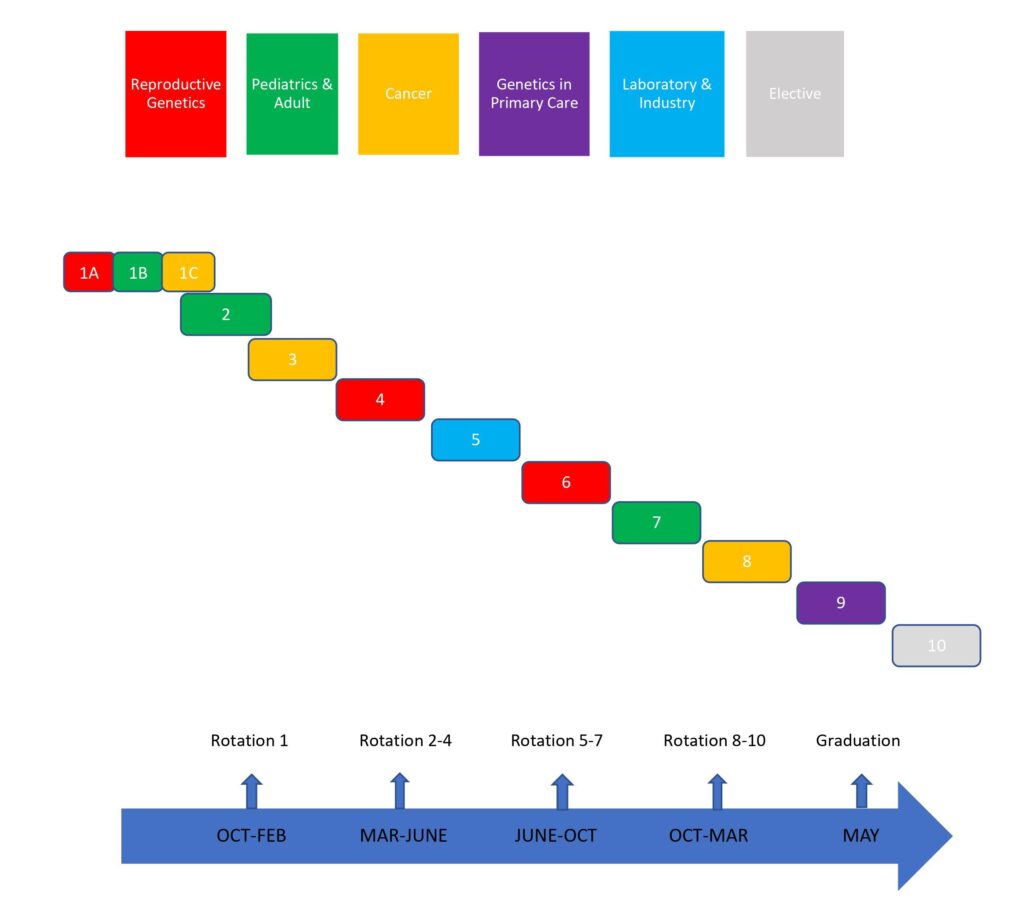Practicum
Practicum: Genetic Counseling In Action
In your first spring semester, you’ll dive into your core clinical rotations— and not just to observe. With a fall semester of coursework and clinical workshops under your belt, you’ll be well-equipped to meaningfully contribute to the space as a provider-in-training.
Visit each rotation multiple times
With a world-class academic medical center right next door, we’ve built in return rotations for each clinical setting, so you can get a closer look at the environment over your time as a trainee.
Rather than spending a single lengthy session in each clinic, we’ve broken the practicum experience into alternating five-week blocks. This means you can return to each setting at different times in your trainee journey and try out new skills you’ve acquired along the way.
All in all, you’ll get a chance to visit each of the core rotations three times, for a total of eleven weeks in each setting.
Start with introductory weeks in the three core rotations
Begin your clinical experience with a one-week rotation at each of the three major practicum sites. These introductory weeks, start in mid-October of your first semester, will help you get to know the faculty in each setting and develop a sense for the clinic’s daily work, before launching into your immersive five-week rotations in February of the spring semester.
Stay up-to-date for your specialty choice— and for the board exam!
Visiting each setting multiple times means better recall in your experience in a particular rotation.
This keeps your clinical knowledge and relevant case experience fresh for the ABGC genetic counseling exam, and it also helps you choose the specialty area that’s right for you. Returning to each rotation throughout your trainee journey allows you to make an educated judgement about what part of the wide genetic counseling field most energizes you.
Blaze your own path with an elective rotation at VUMC or another medical center
Once you’ve covered the essential skills and cases, it’s time to dive deeper into a specialty area that interests you. We’ve built a 5-week elective block into the curriculum so you can return to a clinical rotation you want to explore further or visit somewhere completely new.
Here’s what including an elective rotation into your schedule may look like:

Learn from the nation’s top medical educators
Joining the Vanderbilt School of Medicine community means joining a family of clinicians who’ve centered their careers on teaching future medical providers.
Our clinicians— including the 18 to 20 genetic counselors who work and teach at VUMC —aren’t just experts at providing care. They’re also top-notch educators, deeply invested in your learning and growth.
What rotations will I visit?
Reproductive Genetics
Located at the Center for Women’s Health at One Hundred Oaks and at the Vanderbilt Fetal Center, this rotation will introduce you prenatal and preconception counseling including concerns about personal and/or family history, abnormal ultrasound findings, high-risk pregnancies, and prenatal screening options. Our prenatal clinical service also conducts regular telemedicine clinics — a great way for you to get comfortable with an important and developing service delivery model.
Pediatrics & Adult Genetics
In this rotation, you’ll get hands-on experience taking family histories, performing medical intake, discussing differential diagnoses, and providing pre- and post-test counseling for adults and kids and families. Our pediatric genetics clinics see a wide range of referrals, including metabolic disease, congenital abnormalities, and neurodevelopmental conditions. You will be introduced to a range of genetic conditions including Angelman Syndrome, cystic fibrosis, Down syndrome, and Huntington’s disease. You’ll have the chance to participate in research meetings, exome or genome sequencing consents, and counseling of newly diagnosed patients and their families. Students also have the chance to work with other specialty groups during their elective, such as the Vanderbilt Undiagnosed Diseases Program, ophthalmology, and inpatient counseling.
Cancer Genetics
At Vanderbilt’s world-class Hereditary Cancer Clinic, you’ll work with nationally recognized genetic counselors and contribute to care for cancer patients and their families. Students participate in multiple ways including taking personal and family histories, providing risk assessments, discussing tests and testing strategies, facilitating decision-making, disclosing results, and more. You’ll also have the chance to join in on clinical meetings and tumor boards to see clinical care beyond the counseling interaction.
Laboratory & Industry
The lab and industury rotation will highlight what it’s like to work in a laboratory or a company in the wider clinical genetics industry. In this rotation, you’ll work with genetic counselors to learn about their roles, which may include variant interpetation, report writing, clinical education, insurance policy, and business development. This will give you a taste of how genetic counselors can use their skills in a variety of settings beyond a clinical role.
Genetics in Primary Care
Students get a chance to give back to the Middle Tennesse community at Vanderbilt’s Shade Tree Clinic, a free clinic established in 2004 to provide services to people who are un- or underinsured. Working with attending physicians, medical students, and other students, genetic counseling students focus on educating patients about cancer genetics while other students provide primary care, pharmacy and social services, health education, and specialty services. Students gain experience in a this unique, fast-paced, multicultural, and interdisciplinary environment.
Full course descriptions can be found in the VUSM catalog.